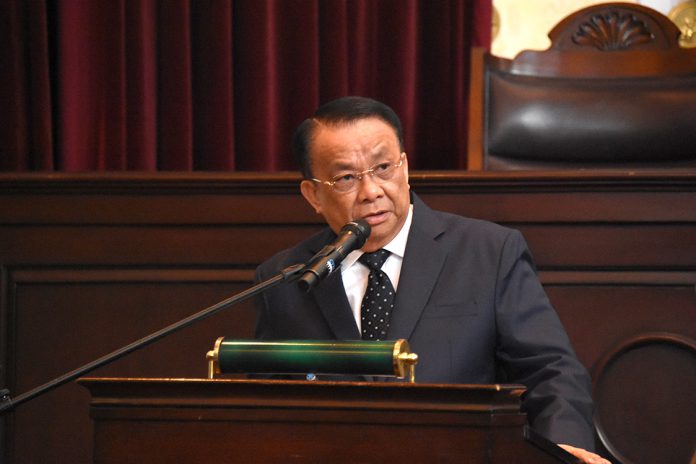News
No ‘judicial legislation’ in ruling on cases: Bersamin

“The accusation of judicial legislation is most often unfair. That is not judicial legislation. That is an interpretation to make the law operate and the courts are free to do that because unless they are free to do that, they cannot interpret the law,” the head magistrate said at the sidelines of his Meet the Press forum.
(File Photo: Supreme Court of the Philippines/Website)
MANILA — Chief Justice Lucas Bersamin on Wednesday took exception to critics claims that the Supreme Court (SC) engages in judicial legislation in key cases, including the acquittal of former President Gloria Macapagal Arroyo, where the High Court first announced the requirement of a mastermind or main plunderer in plunder cases.
“The accusation of judicial legislation is most often unfair. That is not judicial legislation. That is an interpretation to make the law operate and the courts are free to do that because unless they are free to do that, they cannot interpret the law,” the head magistrate said at the sidelines of his Meet the Press forum.
Judicial legislation is defined as the move of a court to step in to craft missing parts, to fill in the gaps in laws, or when it oversteps its discretional boundaries and goes beyond the law to coin doctrines or principles which are not previously established.
“Although law did not use the term main plunderer, it was needed to point out that you, the prosecutor, must say which of these public officials who you are accusing is the main plunderer because there will be others who merely contributed,” Bersamin noted.
Bersamin, the ponente of the SC decision on Arroyo’s acquittal, said he based the ruling on the information on the plunder case against former President Joseph Estrada.
In the Estrada case, Bersamin clarified “the information specified that he was the one who amassed”.
Originally passed in 1991, the Plunder Law or Republic Act 7080 provides that any public officer who, by himself or in connivance with members of his family, relatives by affinity or consanguinity, business associates, subordinates or other persons, amasses, accumulates or acquires ill-gotten wealth through a combination or series of overt or criminal acts , in the aggregate amount or total value of at least PHP50 million, shall be guilty of the crime of plunder and shall be punished by life imprisonment with perpetual absolute disqualification from holding any public office.
Any person who participated with the said public officer in the commission of plunder shall likewise be punished.
In the imposition of penalties, the degree of participation and the attendance of mitigating and extenuating circumstances shall be considered by the court.
The court shall declare any and all ill-gotten wealth and their interests and other incomes and assets including the properties and shares of stock derived from the deposit or investment thereof forfeited in favor of the State, under the said law.
Don’t generalize drug cases
The country’s top magistrate, meanwhile, stressed that each criminal charge arising from the war on drugs deserves separate attention and cautioned against sweeping generalizations and solutions suggested by critics.
“Itong war on drugs, hindi pwedeng sabihin na lalahatin (This war on drugs cannot be subject to sweeping generalizations) because each case has specific facts and backgrounds,” Bersamin told reporters.
Bersamin said the court will continue to go after outlaws, including rogue policemen who break the law, and added that the judiciary continues to support the executive department’s campaign against criminality.
“You know we have always been very clear of police agencies as being held to task if they violate (the law).
Ang problema kasi sa (The problem with the) law on drugs is there are two sides, one the side of the government and the side of the victim or whoever gets killed in the action,” Bersamin said.
“These cases usually end up in court so we cannot make a total approach,” Bersamin noted.





















